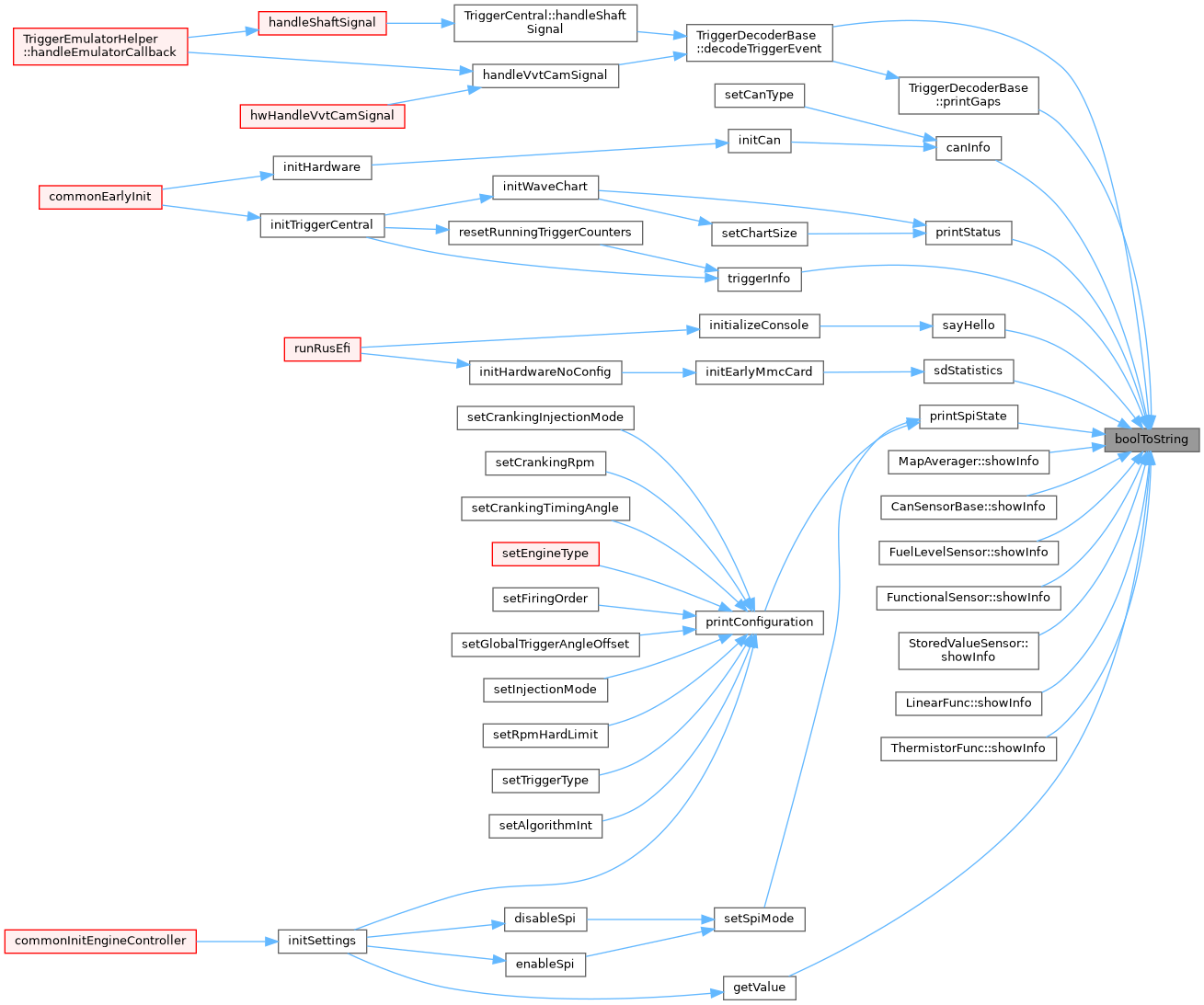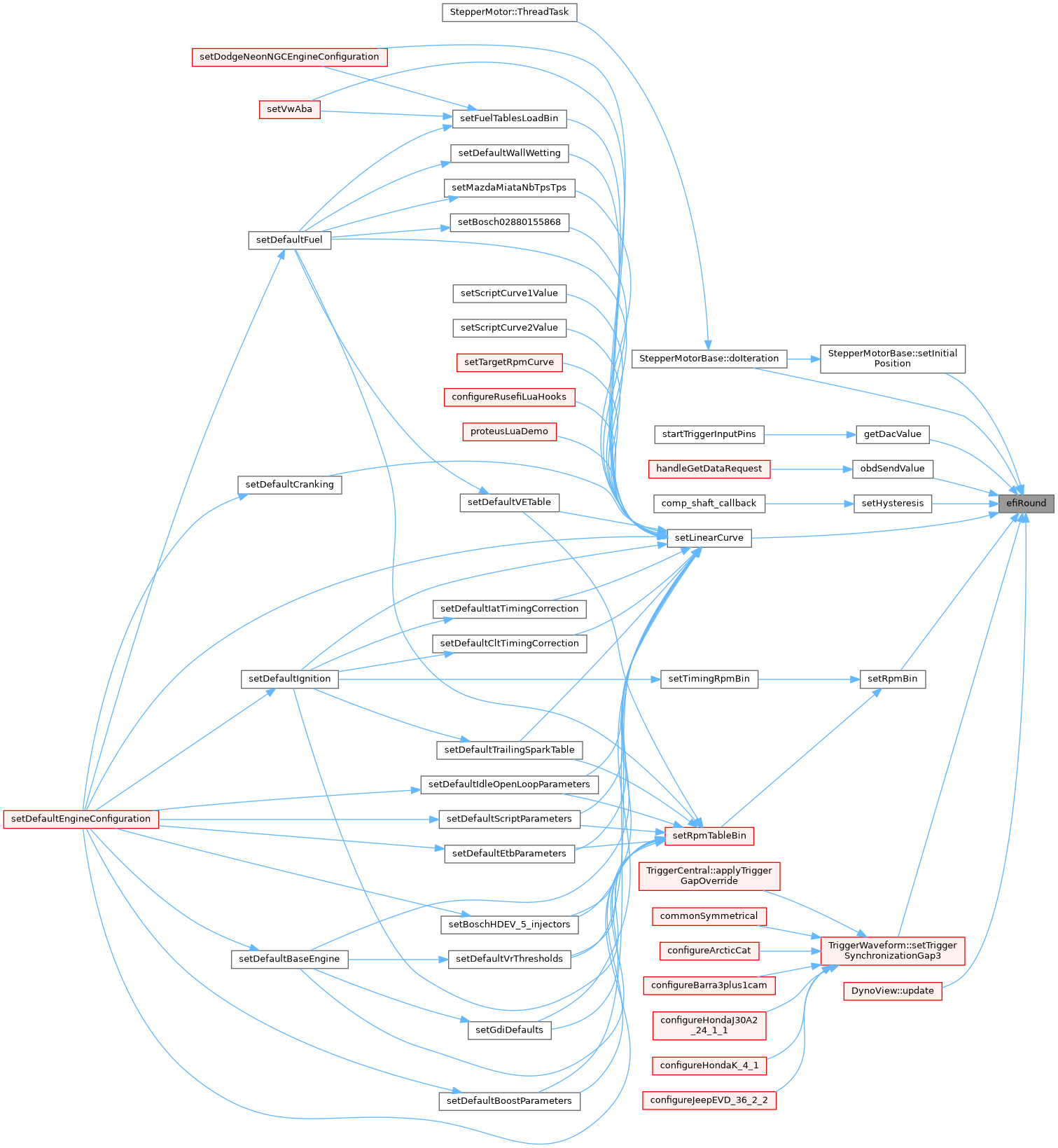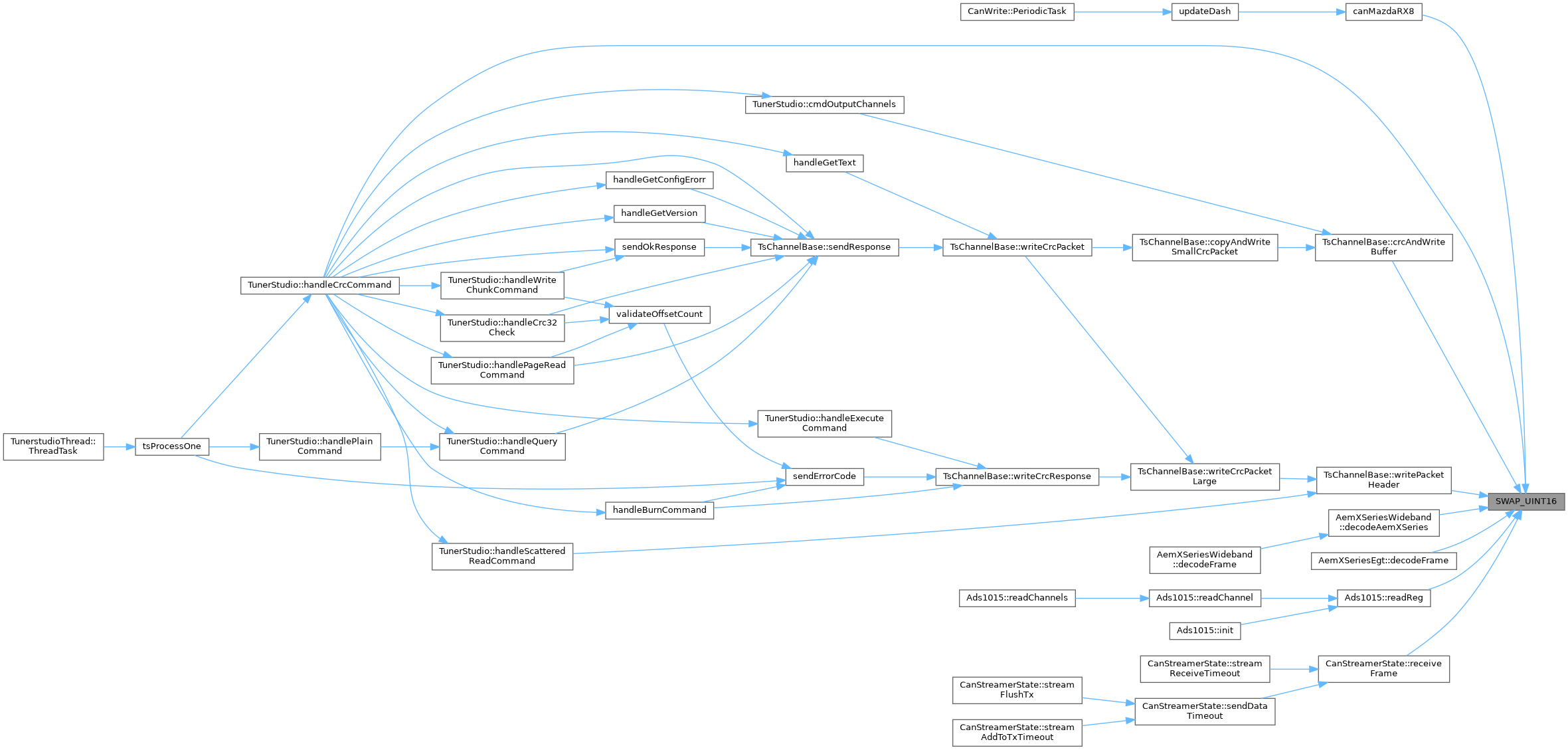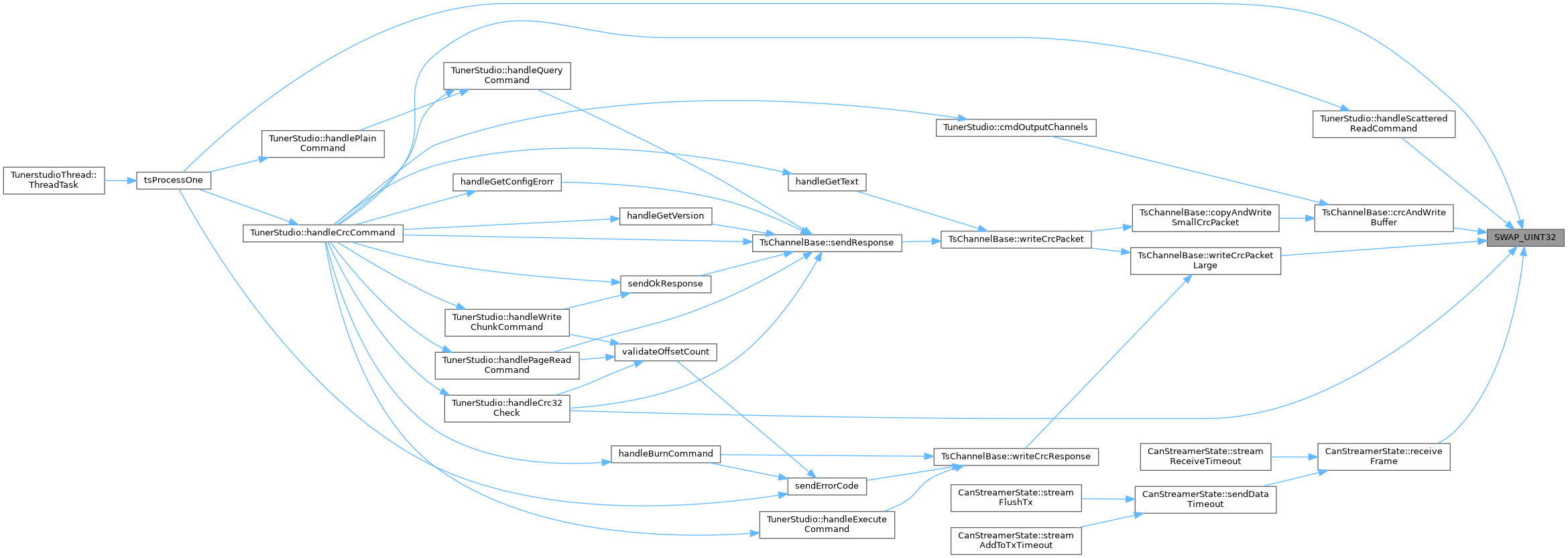Detailed Description
- Date
- Feb 21, 2014
Definition in file efilib.h.
Data Structures | |
| struct | efi::remove_reference< _Ty > |
| struct | efi::remove_reference< _Ty & > |
| struct | efi::remove_reference< _Ty && > |
Namespaces | |
| namespace | efi |
Typedefs | |
| template<class _Ty > | |
| using | efi::remove_reference_t = typename remove_reference< _Ty >::type |
Functions | |
| int | djb2lowerCase (const char *str) |
| uint16_t | SWAP_UINT16 (uint16_t x) |
| uint32_t | SWAP_UINT32 (uint32_t x) |
| const char * | boolToString (bool value) |
| char * | efiTrim (char *param) |
| int | efiPow10 (int param) |
| float | efiRound (float value, float precision) |
| char * | itoa10 (char *p, int num) |
| float | limitRateOfChange (float newValue, float oldValue, float incrLimitPerSec, float decrLimitPerSec, float secsPassed) |
| bool | isPhaseInRange (float test, float current, float next) |
| template<typename T > | |
| bool | isInRange (T min, T val, T max) |
| constexpr size_t | operator- (Gpio a, Gpio b) |
| constexpr Gpio | operator- (Gpio a, size_t b) |
| constexpr Gpio | operator+ (Gpio a, size_t b) |
| constexpr Gpio | operator+ (size_t a, Gpio b) |
| template<class _Ty > | |
| constexpr remove_reference_t< _Ty > && | efi::move (_Ty &&_Arg) noexcept |
| uint32_t | getBitRangeLsb (const uint8_t data[], int bitIndex, int bitWidth) |
| int32_t | getBitRangeLsbSigned (const uint8_t data[], int bitIndex, int bitWidth) |
| void | setBitRangeLsb (uint8_t data[], int totalBitIndex, int bitWidth, uint32_t value) |
| uint32_t | getBitRangeMsb (const uint8_t data[], int bitIndex, int bitWidth) |
| int32_t | getBitRangeMsbSigned (const uint8_t data[], int bitIndex, int bitWidth) |
| void | setBitRangeMsb (uint8_t data[], int totalBitIndex, int bitWidth, uint32_t value) |
| uint32_t | getBitRangeMoto (const uint8_t data[], int bitIndex, int bitWidth) |
| int32_t | getBitRangeMotoSigned (const uint8_t data[], int bitIndex, int bitWidth) |
| void | setBitRangeMoto (uint8_t data[], int totalBitIndex, int bitWidth, uint32_t value) |
| int | motorolaMagicFromDbc (int b, int length) |
Function Documentation
◆ boolToString()
Definition at line 19 of file efilib.cpp.
Referenced by canInfo(), TriggerDecoderBase::decodeTriggerEvent(), getValue(), TriggerDecoderBase::printGaps(), printSpiState(), printStatus(), sayHello(), sdStatistics(), MapAverager::showInfo(), CanSensorBase::showInfo(), FuelLevelSensor::showInfo(), FunctionalSensor::showInfo(), StoredValueSensor::showInfo(), LinearFunc::showInfo(), ThermistorFunc::showInfo(), and triggerInfo().

◆ djb2lowerCase()
| int djb2lowerCase | ( | const char * | str | ) |
Definition at line 135 of file efilib.cpp.
Referenced by getConfigValueByName(), getOutputValueByName(), setConfigValueByName(), and vinStrategy().

◆ efiPow10()
| int efiPow10 | ( | int | param | ) |
Definition at line 111 of file efilib.cpp.
Referenced by DisplayErrorCode(), and efiPow10().


◆ efiRound()
Rounds value to specified precision.
- Parameters
-
precision some pow of 10 value - for example, 100 for two digit precision precision for example '0.1' for one digit fractional part
Definition at line 34 of file efilib.cpp.
Referenced by StepperMotorBase::doIteration(), getDacValue(), obdSendValue(), setHysteresis(), StepperMotorBase::setInitialPosition(), setLinearCurve(), setRpmBin(), TriggerWaveform::setTriggerSynchronizationGap3(), and DynoView::update().

◆ efiTrim()
Definition at line 40 of file efilib.cpp.
Referenced by TunerStudio::handleExecuteCommand().

◆ getBitRangeLsb()
| uint32_t getBitRangeLsb | ( | const uint8_t | data[], |
| int | bitIndex, | ||
| int | bitWidth | ||
| ) |
Definition at line 212 of file efilib.cpp.
Referenced by processHyundai().


◆ getBitRangeLsbSigned()
| int32_t getBitRangeLsbSigned | ( | const uint8_t | data[], |
| int | bitIndex, | ||
| int | bitWidth | ||
| ) |
Definition at line 215 of file efilib.cpp.

◆ getBitRangeMoto()
| uint32_t getBitRangeMoto | ( | const uint8_t | data[], |
| int | bitIndex, | ||
| int | bitWidth | ||
| ) |
Definition at line 277 of file efilib.cpp.

◆ getBitRangeMotoSigned()
| int32_t getBitRangeMotoSigned | ( | const uint8_t | data[], |
| int | bitIndex, | ||
| int | bitWidth | ||
| ) |
Definition at line 281 of file efilib.cpp.

◆ getBitRangeMsb()
| uint32_t getBitRangeMsb | ( | const uint8_t | data[], |
| int | bitIndex, | ||
| int | bitWidth | ||
| ) |
Definition at line 224 of file efilib.cpp.
Referenced by getBitRangeMoto(), and getBitRangeMotoSigned().


◆ getBitRangeMsbSigned()
| int32_t getBitRangeMsbSigned | ( | const uint8_t | data[], |
| int | bitIndex, | ||
| int | bitWidth | ||
| ) |
Definition at line 227 of file efilib.cpp.

◆ isInRange()
| bool isInRange | ( | T | min, |
| T | val, | ||
| T | max | ||
| ) |
Definition at line 82 of file efilib.h.
Referenced by TriggerDecoderBase::isSyncPoint(), and TriggerDecoderBase::printGaps().

◆ isPhaseInRange()
Definition at line 176 of file efilib.cpp.
Referenced by MapAveragingModule::onEnginePhase(), onTriggerEventSparkLogic(), InjectionEvent::onTriggerTooth(), and AngleBasedEvent::shouldSchedule().

◆ itoa10()
Integer to string
- Returns
- pointer at the end zero symbol after the digits
Definition at line 107 of file efilib.cpp.
Referenced by addEngineSnifferCrankEvent(), addEngineSnifferTdcEvent(), WaveChart::addEvent3(), incLogFileName(), prepareLogFileName(), and putTwoSymbolDecimal().


◆ limitRateOfChange()
| float limitRateOfChange | ( | float | newValue, |
| float | oldValue, | ||
| float | incrLimitPerSec, | ||
| float | decrLimitPerSec, | ||
| float | secsPassed | ||
| ) |
Definition at line 170 of file efilib.cpp.
Referenced by EngineState::updateTChargeK().

◆ motorolaMagicFromDbc()
| int motorolaMagicFromDbc | ( | int | b, |
| int | length | ||
| ) |
Definition at line 266 of file efilib.cpp.
Referenced by getBitRangeMoto(), getBitRangeMotoSigned(), and setBitRangeMoto().

◆ operator+() [1/2]
◆ operator+() [2/2]
◆ operator-() [1/2]
◆ operator-() [2/2]
◆ setBitRangeLsb()
| void setBitRangeLsb | ( | uint8_t | data[], |
| int | totalBitIndex, | ||
| int | bitWidth, | ||
| uint32_t | value | ||
| ) |
Definition at line 234 of file efilib.cpp.
Referenced by setBitRangeLsb().


◆ setBitRangeMoto()
| void setBitRangeMoto | ( | uint8_t | data[], |
| int | totalBitIndex, | ||
| int | bitWidth, | ||
| uint32_t | value | ||
| ) |
Definition at line 289 of file efilib.cpp.

◆ setBitRangeMsb()
| void setBitRangeMsb | ( | uint8_t | data[], |
| int | totalBitIndex, | ||
| int | bitWidth, | ||
| uint32_t | value | ||
| ) |
Definition at line 250 of file efilib.cpp.
Referenced by setBitRangeMoto(), and setBitRangeMsb().


◆ SWAP_UINT16()
|
inline |
Definition at line 22 of file efilib.h.
Referenced by canMazdaRX8(), TsChannelBase::crcAndWriteBuffer(), AemXSeriesWideband::decodeAemXSeries(), AemXSeriesEgt::decodeFrame(), TunerStudio::handleCrcCommand(), Ads1015::readReg(), and TsChannelBase::writePacketHeader().

◆ SWAP_UINT32()
|
inline |
Definition at line 27 of file efilib.h.
Referenced by TsChannelBase::crcAndWriteBuffer(), TunerStudio::handleCrc32Check(), TunerStudio::handleScatteredReadCommand(), tsProcessOne(), TsChannelBase::writeCrcPacketLarge(), and TsChannelBase::writeCrcPacketTail().
